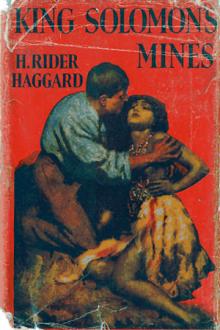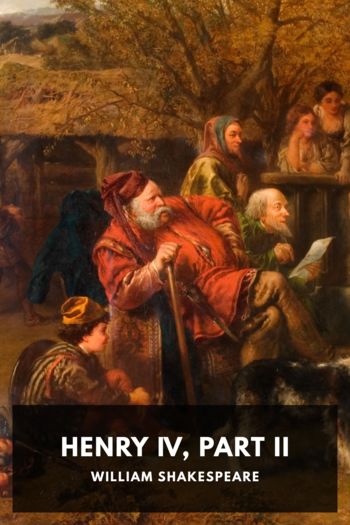King Solomon’s Mines, H. Rider Haggard [best mystery novels of all time TXT] 📗

- Author: H. Rider Haggard
Book online «King Solomon’s Mines, H. Rider Haggard [best mystery novels of all time TXT] 📗». Author H. Rider Haggard
After the turn had once been taken, Good’s recovery was rapid and complete. It was not till he was nearly well that Sir Henry told him of all he owed to Foulata; and when he came to the story of how she sat by his side for eighteen hours, fearing lest by moving she should wake him, the honest sailor’s eyes filled with tears. He turned and went straight to the hut where Foulata was preparing the midday meal, for we were back in our old quarters now, taking me with him to interpret in case he could not make his meaning clear to her, though I am bound to say that she understood him marvellously as a rule, considering how extremely limited was his foreign vocabulary.
“Tell her,” said Good, “that I owe her my life, and that I will never forget her kindness to my dying day.”
I interpreted, and under her dark skin she actually seemed to blush.
Turning to him with one of those swift and graceful motions that in her always reminded me of the flight of a wild bird, Foulata answered softly, glancing at him with her large brown eyes—
“Nay, my lord; my lord forgets! Did he not save my life, and am I not my lord’s handmaiden?”
It will be observed that the young lady appeared entirely to have forgotten the share which Sir Henry and myself had taken in her preservation from Twala’s clutches. But that is the way of women! I remember my dear wife was just the same. Well, I retired from that little interview sad at heart. I did not like Miss Foulata’s soft glances, for I knew the fatal amorous propensities of sailors in general, and of Good in particular.
There are two things in the world, as I have found out, which cannot be prevented: you cannot keep a Zulu from fighting, or a sailor from falling in love upon the slightest provocation!
It was a few days after this last occurrence that Ignosi held his great indaba, or council, and was formally recognised as king by the indunas or head men, of Kukuanaland. The spectacle was a most imposing one, including as it did a grand review of troops. On this day the remaining fragments of the Greys were formally paraded, and in the face of the army thanked for their splendid conduct in the battle. To each man the king made a large present of cattle, promoting them one and all to the rank of officers in the new corps of Greys which was in process of formation. An order was also promulgated throughout the length and breadth of Kukuanaland that, whilst we honoured the country by our presence, we three were to be greeted with the royal salute, and to be treated with the same ceremony and respect that was by custom accorded to the king. Also the power of life and death was publicly conferred upon us. Ignosi, too, in the presence of his people, reaffirmed the promises which he had made, to the effect that no man’s blood should be shed without trial, and that witch-hunting should cease in the land.
When the ceremony was over we waited upon Ignosi, and informed him that we were now anxious to investigate the mystery of the mines to which Solomon’s Road ran, asking him if he had discovered anything about them.
“My friends,” he answered, “I have discovered this. It is there that the three great figures sit, who here are called the ‘Silent Ones,’ and to whom Twala would have offered the girl Foulata as a sacrifice. It is there, too, in a great cave deep in the mountain, that the kings of the land are buried; there ye shall find Twala’s body, sitting with those who went before him. There, also, is a deep pit, which, at some time, long-dead men dug out, mayhap for the stones ye speak of, such as I have heard men in Natal tell of at Kimberley. There, too, in the Place of Death is a secret chamber, known to none but the king and Gagool. But Twala, who knew it, is dead, and I know it not, nor know I what is in it. Yet there is a legend in the land that once, many generations gone, a white man crossed the mountains, and was led by a woman to the secret chamber and shown the wealth hidden in it. But before he could take it she betrayed him, and he was driven by the king of that day back to the mountains, and since then no man has entered the place.”
“The story is surely true, Ignosi, for on the mountains we found the white man,” I said.
“Yes, we found him. And now I have promised you that if ye can come to that chamber, and the stones are there—”
“The gem upon thy forehead proves that they are there,” I put in, pointing to the great diamond I had taken from Twala’s dead brows.
“Mayhap; if they are there,” he said, “ye shall have as many as ye can take hence—if indeed ye would leave me, my brothers.”
“First we must find the chamber,” said I.
“There is but one who can show it to thee—Gagool.”
“And if she will not?”
“Then she must die,” said Ignosi sternly. “I have saved her alive but for this. Stay, she shall choose,” and calling to a messenger he ordered Gagool to be brought before him.
In a few minutes she came, hurried along by two guards, whom she was cursing as she walked.
“Leave her,” said the king to the guards.
So soon as their support was withdrawn, the withered old bundle—for she looked more like a bundle than anything else, out of which her two bright and wicked eyes gleamed like those of a snake—sank in a heap on to the floor.
“What will ye with me, Ignosi?” she piped. “Ye dare not touch me. If ye touch me I





Comments (0)